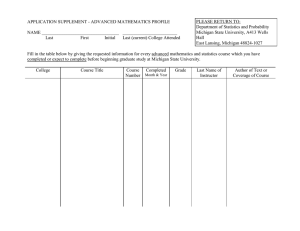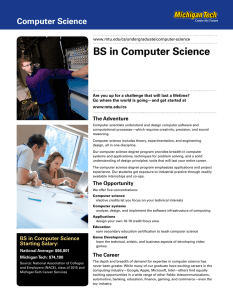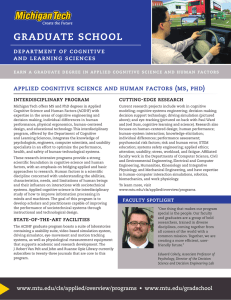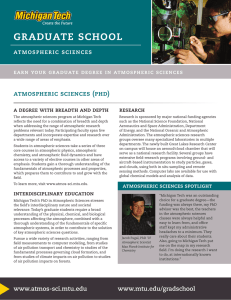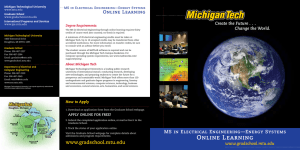graduate school college of sciences and arts
advertisement
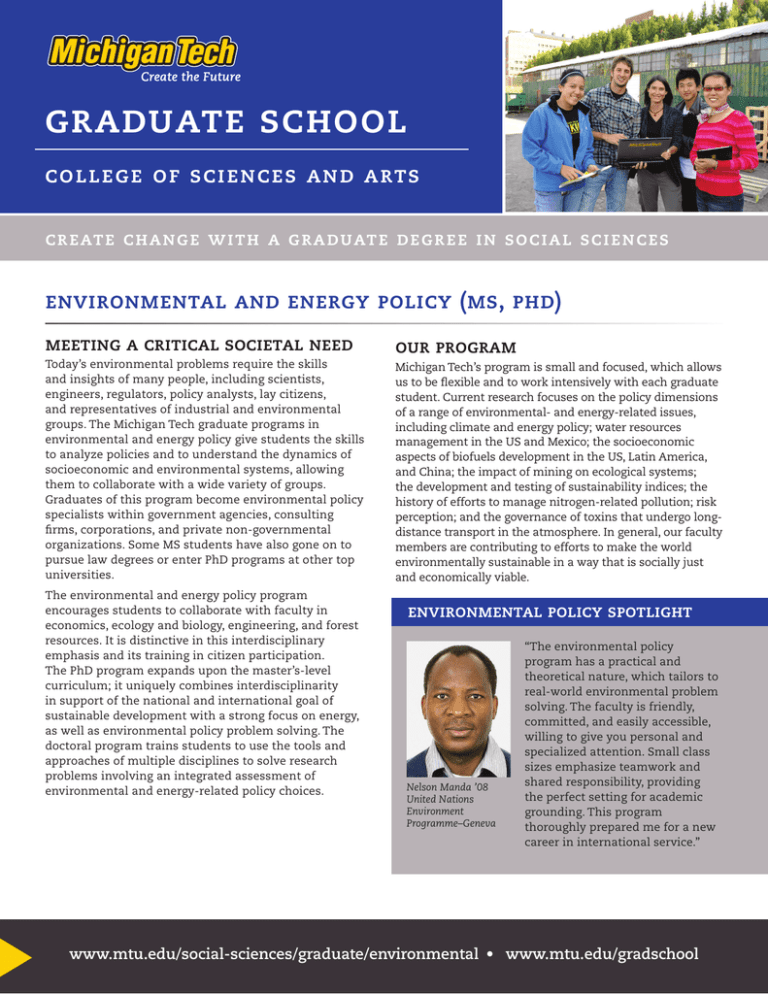
graduate school college of sciences and arts create change with a graduate degree in social sciences environmental and energy policy (ms, phd) meeting a critical societal need Today’s environmental problems require the skills and insights of many people, including scientists, engineers, regulators, policy analysts, lay citizens, and representatives of industrial and environmental groups. The Michigan Tech graduate programs in environmental and energy policy give students the skills to analyze policies and to understand the dynamics of socioeconomic and environmental systems, allowing them to collaborate with a wide variety of groups. Graduates of this program become environmental policy specialists within government agencies, consulting firms, corporations, and private non-governmental organizations. Some MS students have also gone on to pursue law degrees or enter PhD programs at other top universities. The environmental and energy policy program encourages students to collaborate with faculty in economics, ecology and biology, engineering, and forest resources. It is distinctive in this interdisciplinary emphasis and its training in citizen participation. The PhD program expands upon the master’s-level curriculum; it uniquely combines interdisciplinarity in support of the national and international goal of sustainable development with a strong focus on energy, as well as environmental policy problem solving. The doctoral program trains students to use the tools and approaches of multiple disciplines to solve research problems involving an integrated assessment of environmental and energy-related policy choices. our program Michigan Tech’s program is small and focused, which allows us to be flexible and to work intensively with each graduate student. Current research focuses on the policy dimensions of a range of environmental- and energy-related issues, including climate and energy policy; water resources management in the US and Mexico; the socioeconomic aspects of biofuels development in the US, Latin America, and China; the impact of mining on ecological systems; the development and testing of sustainability indices; the history of efforts to manage nitrogen-related pollution; risk perception; and the governance of toxins that undergo longdistance transport in the atmosphere. In general, our faculty members are contributing to efforts to make the world environmentally sustainable in a way that is socially just and economically viable. environmental policy spotlight Nelson Manda ’08 United Nations Environment Programme–Geneva “The environmental policy program has a practical and theoretical nature, which tailors to real-world environmental problem solving. The faculty is friendly, committed, and easily accessible, willing to give you personal and specialized attention. Small class sizes emphasize teamwork and shared responsibility, providing the perfect setting for academic grounding. This program thoroughly prepared me for a new career in international service.” www.mtu.edu/social-sciences/graduate/environmental • www.mtu.edu/gradschool admission requirements about michigan tech Application deadline: Apply by February 15 for the fall semester. Applications are reviewed on an individual basis using a holistic approach. Michigan Technological University, founded in 1885, has gained worldwide recognition for innovative education and scholarship. Michigan Tech is a leading public research university, exploring the boundaries of knowledge, developing new technologies, and preparing students to create the future for a prosperous and sustainable world. Michigan Tech offers more than seventy graduate degree programs in engineering, forestry and environmental sciences, computing, business and economics, natural and physical sciences, technology, humanities, and social sciences. All Students • Graduate School application • Statement of purpose • Official transcripts • GRE required • Three letters of recommendation • Résumé/curriculum vitae • Writing sample • Recommended GPA of 3.0/4.0 or better • Prerequisites: Environmental Sciences, Microeconomics and Statistics International Students • TOEFL: Recommended score of 100 iBT finance your future Earning your graduate degree is an investment in your career and your future. Here are a few financial aid opportunities you can explore as you look for ways to pay for your degree. • Graduate student funding support is available but very limited. We are able to offer a small number of assistantships that pay a living wage stipend, tuition, and most fees, with priority given to PhD students. • Many graduate students are eligible for a new set of federal loans, up to $20,500 per academic year, as an independent student. • Contact Michigan Tech’s Financial Aid Office at 906-487-2622 or finaid@mtu.edu for more information on financial aid opportunities. about houghton Houghton lies in the heart of Upper Michigan’s scenic Keweenaw Peninsula. The campus overlooks the Keweenaw Waterway and is just a few miles from Lake Superior. The area’s waters and forests, including our 600-acre recreational forest adjoining campus, offer students unparalleled opportunity for outdoor recreation and relaxation. The University’s 7,000 students come from all fifty states and more than sixty nations, making the area a vibrant, multicultural community. applying is easy—and free! www.mtu.edu/gradschool/admissions/apply Department of Social Sciences Michigan Technological University Academic Office Building, Second Floor 1400 Townsend Drive • Houghton, MI 49931-1295 Phone 906-487-2113 • Fax 906-487-2468 • Email hsgorman@mtu.edu www.mtu.edu/social-sciences/graduate/environmental Graduate School Email gradadms@mtu.edu or call 906-487-2327 www.mtu.edu/gradschool Michigan Technological University is an equal opportunity educational institution/equal opportunity employer, which includes providing equal opportunity for protected veterans and individuals with disabilities. 34022/0714









